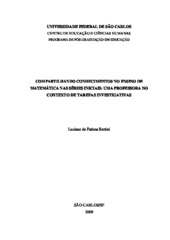Compartilhando conhecimentos no ensino de matemática nas séries iniciais: uma professora no contexto de tarefas investigativas
Abstract
Interest and concern about mathematics teaching in early grades of elementary school were the driving force behind the making of this paper. The choice of investigative work as the
main focus of the research reflects the search for leaving out mathematics teaching based on reproduction of procedures and algorithms. The work suggests a change in classroom
dynamics by involving students in a more active way in their learning and mainly by motivating their creativity and reflection. The question which led the development of the
research was: What are the limitations and the power of using investigative work in mathematics teaching in the early grades of elementary school starting from a teacher s actions and reflections? By aiming to help and expand the discussions over the usage of this kind of work, this qualitative study with action-research characteristics provides reflections on viability of the usage of this work in the early grades by polyvalent teachers. The theoretical references that support the research concern studies on investigative work and the changing scene suggested to the teacher when a new methodology is used. The references concerning this scene involve matters of fear and insecurity and point out reflection and partnership as a way of overcoming them. Data was obtained from a teacher and students from a third grade from a local public school and its collection was carried out through partnership between the teacher and the researcher at moments of study, preparation and reflection over the work done in the classroom. The data in this research was gathered through an interview with the teacher, audio and video recordings, questionnaire answered by the teacher and reports written by her, students records and researcher s notes. The analysis of the data was done in a way to highlight the moments that make up the classroom process in which it was possible to notice and highlight, through the teacher s actions and reflections, limitations and power of usage of investigative work in the early grades. The power identified in the investigation show the possibility of using this work in early grades mathematics teaching, thus contributing not only for the learning of mathematics, but also for the development of attitudes such as autonomy and mutual respect. The limitations observed in many moments were overcome or minimized by the teacher s reflexive attitude and group work, which was shared with the researcher. The
study points out that if the disagreement between an innovative methodological proposal, such as mathematical investigation in early grades, and a school structure that privileges aspects of traditional teaching is not abandoned, even if the proposal proves itself successful, it will be limited to a small universe.
